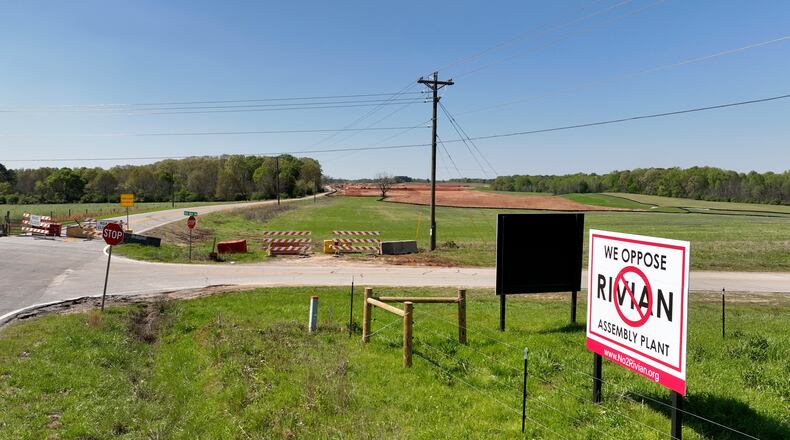If Rivian opponents want to continue one lawsuit against the zoning and permits for the planned $5 billion electric vehicle factory east of Atlanta, a judge said Friday they’ll have to pony up some serious change.
Fulton County Superior Court Judge Thomas Cox Jr. issued an order for the six plaintiffs to pay nearly $365,000 to cover legal costs and attorney’s fees for the state and a local development authority. The governments asked Cox to order the plaintiff to pre-pay legal fees under what’s known as a petition for bond, a tactic designed to discourage frivolous lawsuits against local and state governments.
Attorneys for the Georgia Department of Economic Development and the Joint Development Authority of Jasper, Morgan, Newton and Walton Counties (JDA) argued the Rivian opponents’ lawsuits are “frivolous” and are designed only to hinder the factory’s construction. The plaintiffs were involved in a similar lawsuit in Morgan County last year that they withdrew after failing to get a judge to issue a stop-work order.
In his 11-page order, Cox agreed.
“Plaintiffs’ ultimate goal in repeatedly filing the same lawsuit appears to be to derail the Rivian Project by bogging it down in time-consuming and costly litigation,” the order said.
The judge, however, gave the state Supreme Court and Court of Appeals the opportunity to review the decision before it goes into effect, meaning the order could be reversed or amended before the plaintiffs pay a penny.
Credit: HYOSUB SHIN / AJC
Credit: HYOSUB SHIN / AJC
John Christy, an Atlanta attorney representing the plaintiffs, argues the state took over the 2,000-acre Rivian site to avoid public scrutiny during rezoning discussions. He previously told The Atlanta Journal-Constitution the petition “is simply a means of trying to discourage my clients from proceeding.”
While he disagrees with Cox’s initial order, Christy thanked the judge for giving the higher courts the option to intervene.
Christy’s clients include six residents who live or own property near the Rivian site. They currently are embroiled in two zoning-related lawsuits against government officials related to the Rivian project, one of the state’s largest economic development deals and a promised 7,500 jobs.
One lawsuit is in Fulton against the state and JDA. The other is a new complaint filed this year in Morgan County and accuses that county’s leaders of failing to enforce their codes. The state and JDA also filed motions to intervene in the Morgan County case.
Both lawsuits effectively make the same claims, accusing the state of circumventing local zoning codes to avoid local pushback.
In February 2022, the state assumed control of the project site, which is owned by the JDA. The state simultaneously withdrew rezoning requests before local officials got a chance to vote on them. In many situations, local zoning does not apply to state-owned land, which includes properties owned by development authorities.
Credit: Natrice Miller / Natrice.Miller@ajc.com
Credit: Natrice Miller / Natrice.Miller@ajc.com
Several Morgan County residents filed a lawsuit last year to challenge the takeover and stop excavation. But they withdrew the lawsuit in December after Ocmulgee Judicial Circuit Judge Stephen Bradley declined to issue a stop-work order — only to effectively refile the suits at the end of January.
In a joint statement, the state and JDA said Friday that, “It’s time for the Plaintiffs to stop the needless legal challenges, stop wasting taxpayers’ money and stop trying to derail a historic job-creating project that will undoubtedly improve the lives of millions of Georgians.”
The state added that Bradley, the same judge over the new Morgan County lawsuit, said that Rivian opponents have an uphill battle to stop the project from moving forward. In Fulton, Cox issued a similarly dour outlook for the plaintiffs.
“At this stage of the litigation, the State has presented strong arguments that it will prevail in this action,” his order said. “... Plaintiffs’ argument that Rivian’s involvement in the project somehow means the project is not for a governmental purpose is unpersuasive.”
Cox said it was in the public interest for the Rivian opponents to pre-pay the litigation fees in case the state and JDA prevail. The plaintiffs will have to pay the governments’ litigation costs as a bond, which could be repaid to the residents if they win the lawsuit.
“We’re convinced that we are correct on the interpretation of the law and respectively disagree with Judge Cox,” Christy said. “But we’ll all see what the right answer is when our appellate courts weigh in.”
At the end of March, the plaintiffs held a barbeque fundraiser for their legal costs, with hundreds attending and donating. Christy said his clients won’t be intimidated.
Credit: Steve Schaefer
Credit: Steve Schaefer
In a separate legal battle, the state and JDA are asking an appeals court panel to reinstate some $700 million of local tax breaks that were struck down by a different local judge. Regardless of how the panel rules, the case is likely to be appealed again to Georgia Supreme Court.
California-based Rivian has the ability to terminate its agreement with the state and JDA in May if the local tax breaks aren’t approved. But Rivian CEO R.J. Scaringe recently said hat “the future of our company in terms of scaling and growing really relies on the future of this project” in Georgia.
Cox Enterprises, owner of The Atlanta Journal-Constitution, owns about a 4% stake in Rivian.
About the Author
Keep Reading
The Latest
Featured





